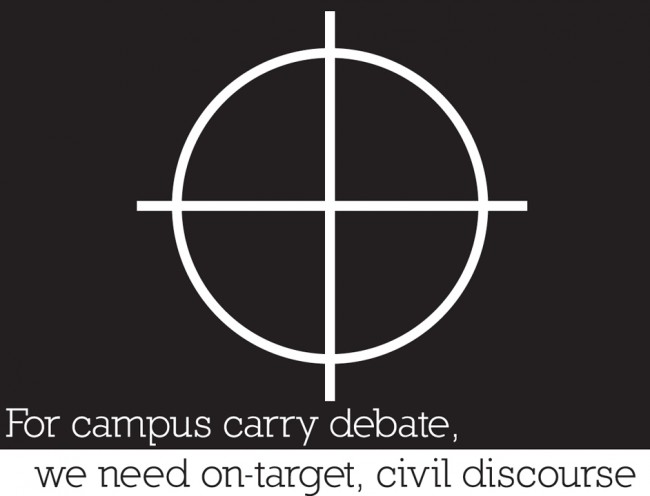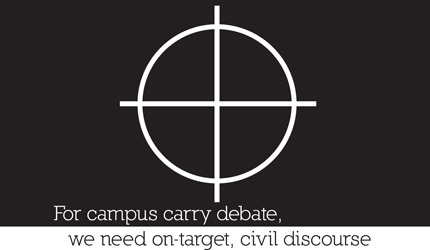
House Bill 750, a piece of state legislation that would require public universities to allow license holders to bring concealed handguns on campus, now has 81 of the 150 House representatives listed as co-authors. The senatorial equivalent has 14 of the 31 senators on board.
The bills include a clause that allows private universities — after consulting students, faculty and staff — to “adopt rules, regulations, or other provisions prohibiting license holders from carrying handguns on premises that are owned or operated by the institution and located on the campus of the institution.”
Simply because Baylor would be allowed to opt out of the bill, however, doesn’t necessarily mean it should. Though President Ken Starr— along with several officials in the government relations office — have made public their disdain for the on-campus carrying of concealed weapons, there is still an opportunity for the members of this university to come to a decision after civil, legitimate and copious discussion.

There are certainly two sides to this debate. Those in favor argue that any student that goes through the process to obtain a concealed handgun license (CHL) should rightfully be allowed to carry on campus.
Many campus carry supporters also concede that the exception clause for private universities is necessary.
On the other hand, others say allowing on campus carry would greatly compromise security and create an unsafe environment. From haphazard shootings to the idea of college life being mixed with guns, concealed carry opponents simply think the whole is safer without gun carriers.
Guns are symbols that hold one of the most volatile stigmas in American society and, because of that, we see misnomers and ill-informed arguments convoluting the already hazy conversations.
For instance, many against campus carry think the class that is required to get a CHL is simply about shooting. According to the Texas Concealed Handgun Association, the class is 10 to 15 hours and includes a written examination and a shooting practice.
The association’s website states “the written exam covers law, nonviolent conflict resolution, and handgun use and storage” and a passing grade is 70 percent or higher.
But it isn’t just about a written test and a shooting range practice. For CHL approval in the State of Texas, one must also:
- Be 21 years old
- Have a clean criminal history, including military service and recent juvenile records
- Not be under a protective order
- Not be chemically dependent
- Not be of unsound mind
- Not be delinquent in paying fines, fees, child support, etc.
- Be eligible to purchase a handgun by completing the National Instant Criminal Background Check
With that, we wonder what could be in support of not allowing those that satisfy all of the aforementioned requirements to carry on campus?
What seems to be the most prevalent point from the opposite side is that allowing college students to carry guns on campus and into classrooms has inherent risks.
Many opposing campus carry argue that the college experience is not the proper place for CHL holders. They associate college with environments that consistently include substances that impair your judgment.
As a case study, Baylor is an outlier — a Christian, private school with only 15,000 undergraduates. The average age of the undergraduates is 20.5 years of age and with all other schools (seminary, law, etc.) the average age increases to 21.9.
The average junior is 21.0 years of age and the average senior is 22.3. The longstanding CHL age requirement rules out the average lowerclassman from considering a CHL. Of the upperclassmen that could get a CHL, it is practically unpredictable to gauge just how many would actually go through the CHL process.
Texas saw 123, 325 applications for CHLs from September 2009 to August 2010. Twenty-one-year-old applicants made up 1.61 percent of the applications, or a mere 1,990, and 22-year-olds accounted for 1.36 percent, or 1,672, of the applications.
That means that of all the 21-year-olds in the entire state, only 1,990 of them applied for CHLs. Initially, Baylor would not see a large number of CHL holding students.
The unknown, however, is whether the proposed legislation would significantly increase the number of CHL holding college enrollees. That is, perhaps the small number of 21-and 22- year-olds is caused by the anti-gun policies at state universities. It’s a rather uncertain correlation.
Either way, those in favor of on- campus carry feel their rights are being suppressed.
The Young Conservatives of Texas and the Texas College Republicans have jointly announced that the organizations both consider campus carry the top priority of the 2011 Texas Legislature.
As previously stated, the dangerous connotation that comes along with the word gun pushes many to a quick judgment.
The facts, though, point to the idea that this topic is one that needs to be carefully considered. In fact, if HB 750 does pass, private universities would be required to consult with students, faculty and staff before deciding on weapons policies.
It is a clause that Baylor should take seriously. We are grateful that the proposed legislation would give our administrators the authority to choose, and the best way to come to a decision that best suits Baylor is to get our family talking.
Each distinct population within Baylor — from faculty to students — will be affected differently by the administration’s choice. This is an issue that should not be decided until opposing sides of the issue are brought to the attention of Baylor officials.
We hope the decision isn’t already made by the administration (though it seems that way).
We want members of the Baylor community to use the opportunity to lobby for their side constructively.
This is such a hot-button issue that civil engagement of both sides may clear the air, bust the rumors and actually produce progress. If we are never given the opportunity speak, then we’ll sit idle and learn nothing.
Civil discourse is a rarity in our society, but embedded in this controversial issue is a chance for Baylor to promote it.







